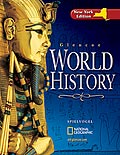Glencoe World History New York EditionChapter 7:
Early African Civilizations, 2000 B.C.– A.D. 1500Web Activity Lesson PlansIntroduction
Traders in Africa began trading gold for salt and other goods long before the arrival of Islam on the continent. In this activity students will learn how these two major developments became closely linked after Islam first appeared in Africa. Lesson Description
Students will go to the Trans-Saharan Gold Trade Web site of the Metropolitan Museum of Art to read about the trans-Saharan gold trade. They will also click on links on that page to learn about the major kingdoms of the period and about the spread of Islam. Students will answer four questions about what they have read. They will then create a timeline that includes the major events in the history of the gold trade and the spread of Islam. Instructional Objectives - Students will be able to discuss connections between the gold trade and the spread of Islam in Africa.
- Students will be able to arrange related events chronologically.
Student Web Activity Answers - The Islamic states of North Africa wanted gold to mint coins.
- The eleventh-century geographer al-Bakri listed these items in a description of the court at Kumbi Saleh in the kingdom of Ghana.
- In the eighth and ninth centuries, Arab merchants bought gold from the Berbers and financed further caravan trade. These transactions encouraged many Berbers to convert to Islam.
- The prospecting and production of gold were traditionally linked to native beliefs and magical practices. Since these beliefs and practices were alien to Islam, it was not in the ruler's interest to encourage conversion.
- The list of items included on student timelines will vary somewhat. Most important is for students to place events within the correct century and to identify events that relate to both the gold trade and the spread of Islam. Timelines should include events such as the rise and fall of the Ghana, Mali, and Songhai trading empires, the beginnings of Arab merchant involvement in trans-Saharan trade, the adoption of Islam by the Berbers and by sub-Saharan African kings, Mansa Musa's pilgrimage to Makkah, and the visits of important observers such as al-Bakri and Ibn Battuta.
 | 






